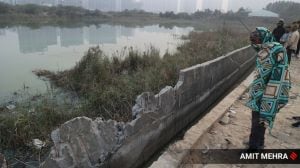Superpower embedded in trouble
Among the reasons for US failure in Iraq and, to some extent, in Afghanistan, is widely believed to be absence of good intelligence. How dis...

Among the reasons for US failure in Iraq and, to some extent, in Afghanistan, is widely believed to be absence of good intelligence. How distant April 9, 2003 appears today. Remember, Saddam Hussain8217;s statue being pulled down in Baghdad8217;s Firdaus Square? The Pentagon had 8220;embedded8221; 600 journalists and TV crews. This was the moment for them to sing for their supper.
For a worldwide projection of victory, popular participation in celebrations at Saddam8217;s fall had to be contrived. I can never forget the BBC8217;s Raageh Omar, who had earned credit for fair reporting thus far.
On April 9 he expended all the goodwill he had earned by describing the convergence of the people of Baghdad on Firdaus Square. Nothing of the sort had actually happened. It was all make believe.
The statue was pulled down by US marines with the help of a crane. And most of the people around were journalists, their minders and bystanders from Palestine Hotel. But Omar hit top gear: 8220;My God! They are pouring in from all sides.8221;
If ecstatic crowds could not be contrived around Saddam8217;s tilted statue, images had to be created of celebration in some other part of Baghdad. Saddam city, a Shia ghetto, had been settled on the periphery of the city by refugees from the Shia uprising in Najaf and Karbala in 1992, after the first Gulf War.
Ayatullah Baqar-al-Hakim, at this stage still in exile in Iran, gave the signal to his disciples in Najaf and through them the cleric controlling Saddam city. It was then that the mobs defiling Saddam posters materialised on the world8217;s TV screens. Without a signal coming from Hakim, there would have been no celebration in Saddam city.
Why was this story not told at that stage? Because 8220;embedded8221; journalists were clueless about the convoluted sequence of signals from Iran, Najaf, to Saddam city in Baghdad. Unless you could read these signals, you will never have a clue as to what is going on the other side of the civilisational wall you are fabricating. Yes, you may have 8220;mercenary8221; intelligence but it will never be reliable.
The US experience in Afghanistan is replete with instances of warlords pocketing the money and then misleading US troops to attack, destroy and thus settle their ancient tribal scores!
You will have to find people who 8220;believe8221; in what you are about. Only then will this yawning intelligence gap be filled. The erection of the wall to separate Israel from Palestinian enclaves is a symbolic admission by Israel that brute force will be a substitute for intelligence. It will not work.
Just refer to US Vice President Dick Cheney8217;s triumphalist speech delivered on April 9, to coincide with the pulling down of Saddam Hussain8217;s statue. 8220;The success today,8221; said Cheney, 8220;is proof positive of the success of our efforts to transform our military to meet the challenges of the 21st century8230;Having been involved in planning and waging the Persian Gulf War in 1991 as secretary of defence, I think I can say with some authority that this campaign has displayed vastly improved capabilities, far better than we did a dozen years ago. In Desert Storm only 20 per cent of our air-to-ground fighters could guide a laser-guided bomb to target. Today, all of our air-to-ground fighters have the capability. In Desert Storm it usually took up to two days for target planners to get a photo of a target, confirm its co-ordinates, plan the mission and deliver it to the bomber crew. Now we have near real-time imaging of targets with photos and co-ordinates transmitted by e-mail to aircraft already in flight. In Desert Storm we did not yet have the B-2. But the aircraft is now critical to our operations. And on a single bombing sortie, a B-2 can hit 16 separate targets, each with a 2,000 pound, precision guided, satellite based weapon.8221;
All this militarism is explained as the 8220;continuing war on terror8221;. And look where all this hollow triumphalism led America in Iraq? Two years after the Afghan operations and six months after Cheney announced victory in Iraq, what is the state of affairs in both countries?
All the stories of course are not being told: that US soldiers are being daily targeted, that some are committing suicides for being exposed to situations for which they were not prepared. The other day, a Turkish journalist met US troops in the relatively safe Kurdish north. The troops asked almost in unison, 8220;When are they going to send us home!8221; The sheer desperation of it. US troops imploring a Turkish journalist to help them.
Several things went wrong in Afghanistan and Iraq. What needs to be stressed is this: either you can fabricate a civilisational clash, in which case you can destroy any country you like from the air with the sort of machine Cheney was crowing about.
But after the air attacks are over, you will move around blindfolded on the ground because you have not nurtured people who 8220;believe8221; in you and who would be willing to show you the way around Baghdad, Kandahar, any place you target next.
- 01
- 02
- 03
- 04
- 05































